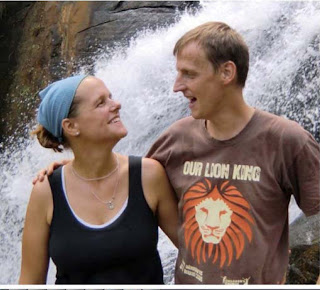A Guest Post by Jan Sassenberg: The Meek Shall Inherit the Earth | Dreaming Beneath the Spires
I love this post in which my friend, Jan Sassenberg grapples with the statement that the meek shall inherit the earth.
Jan and Karoline Sassenberg, who were born Germany, have been serving for the last three years with WORD MADE FLESH in Freetown, Sierra Leone.
Find out more at www.wordmadeflesh.org or email thesassenbergsATyahoo.co.uk.
Jan and Karoline Sassenberg
Blessed are the Meek and the Great Commission
As a teenager, I was scared of the Beatitudes. Brought up in a conservative Free Evangelical Church, it didn’t make sense to me that Christ’s longest and best recorded sermon opened with words about the poor, the meek and the persecuted. Why not have the most important come first? Why not start with: “Surrender to me, Jesus, and you shall be saved!” Was Jesus perhaps more political than my pastors and teachers wanted me to believe? Too scared of becoming “a liberal” and of watering down the gospel I did not dare following this uncomfortable train of thought.
By now, 20 years later, without abandoning my love and complete trust in God’s precious word, I am not scared of liberals anymore. I sometimes rather enjoy looking at our faith from their fresh perspective.
Now, I can see the Beatitudes inspiring South American church leaders to instigate peaceful revolutions against dictators and drug cartels. I am humbled when seeing how liberation theology has given a voice to the voiceless and oppressed.
Now, I live in Sierra Leone, West Africa, as member of Word Made Flesh, a community that is dedicated to serving Jesus among the poorest of the poor of this world. We are reaching out into the slums and favelas of the booming mega cities in the majority world, or as I prefer to call it, the oppressed world. We want to be Jesus’ hands and feet, touching the untouchables, protecting the orphan children, clothing the naked, feeding the hungry, comforting the broken, sheltering the homeless.
Nevertheless, I still find myself puzzled over Jesus’ radical claim. What is it that Christ praises about the attitude of meekness? How can he promise the meek to inherit the earth? Does this reflect reality in a world ruled by social injustice, cruelty, and the survival of the most brutal?
Matthew’s third Beatitude is particularly uncomfortable as it is the only one with the promise of a reward in this world rather than in heaven. All other Beatitudes could be interpreted as finding their fulfillment solely in the after-world: being comforted, hunger being stilled, shown mercy, seeing God, being called sons of God and receiving the kingdom of heaven.
With the blessing of the meek, however, you need to bend the text far to say that “inheriting the earth” simply means inheriting the Christian’s promised land, our eternal home in heaven. I want to believe that this blessing as much as all of them have direct relevance to our identity in Christ now, on this side of the curtain. We know that the promised kingdom of Christ has already started to appear. We believe that we are not just having to wait it out until we reach the other side.
The word “meek” implies peacefulness although it does not only mean the act of peacemaking. The peacemakers receive their own promise later. With the word “meek” Jesus uses the same expression as in His self proclamation: “Come to me, all you who are weary for I am meek and humble in heart.” (Mat. 11:32) The NIV translates “… for I am gentle…”. Jesus is calling to himself the weary and a few verses later Jesus refers to himself as the one who does not quench the smoldering wick.
In Jesus’ own ministry, meekness and humilty are inseparably linked to ministering to the weak and broken. Jesus himself demonstrates his mild and humble approach when he kindly rebukes Martha’s busy bitterness towards her sister Mary. His loving gentleness is woven into his conversation with the Samaritan woman at the well. But despite the softness of his gloves, Jesus is never a conflict-avoiding harmony seeker. He corrects in love.
So how will such a meek disciple inherit the earth? As with all Beatitudes, Jesus does not come up with new ideas but refers here to the Old Testament. Psalm 37:11 says: “The Meek will inherit the land.” From the patriarchs to Jesus’ day, the Israelites had been anticipating the fulfillment of this promise. Becoming again a sovereign independent nation was the ultimate Jewish dream.
But now that Jesus, who said he did not come to abandon the law but to fulfill it, announces his own mission, he goes way beyond that. He promises the whole earth but he does not refer to political power. Jesus speaks here of the new worldwide “Kingdom of God“. We see this wider perspective throughout all his teaching. Asked about taxes Jesus says, “Give to Caesar, what belongs to Caesar and give God what belongs to God.” He refuses to be made king. And nearly all his parables are starting with the phrase: “The kingdom of God is like…” (a mustard seed etc…) All Jesus cares about is to birth this kingdom. Jesus promises “the earth” because it is His declared intention to expand his father’s Kingdom to the very last corner of this planet.
So, how does meekness empower us to reach this world for Christ? Is global mission a question of converting souls, large stadium crusades, and efficient strategies?
Are we in our churches more interested in the message than the recipient? How often do we in our churches and missions run our programmes by means of superior knowledge, skills, finances and powers? And how much do we really achieve with that? Jesus invites us back to caring for the one in front of us. Investing our time, resources and compassion in the “hopeless cases”.
In our community in Freetown, Sierra Leone, we find ourselves often overwhelmed by the vastness of the suffering around us. Children beaten mercilessly and dying needlessly, young women forced into prostitution, hopeless unemployed men turning to crimes and drugs. But in all this we find that God can use us best, when we turn away from programmes and let God use us in our weaknesses and limitations. Where He brings us low we are ready to truly meet our friends in the slum of Kroo Bay at their level. And when we gently touch wounds we see God touch and heal and restore.





